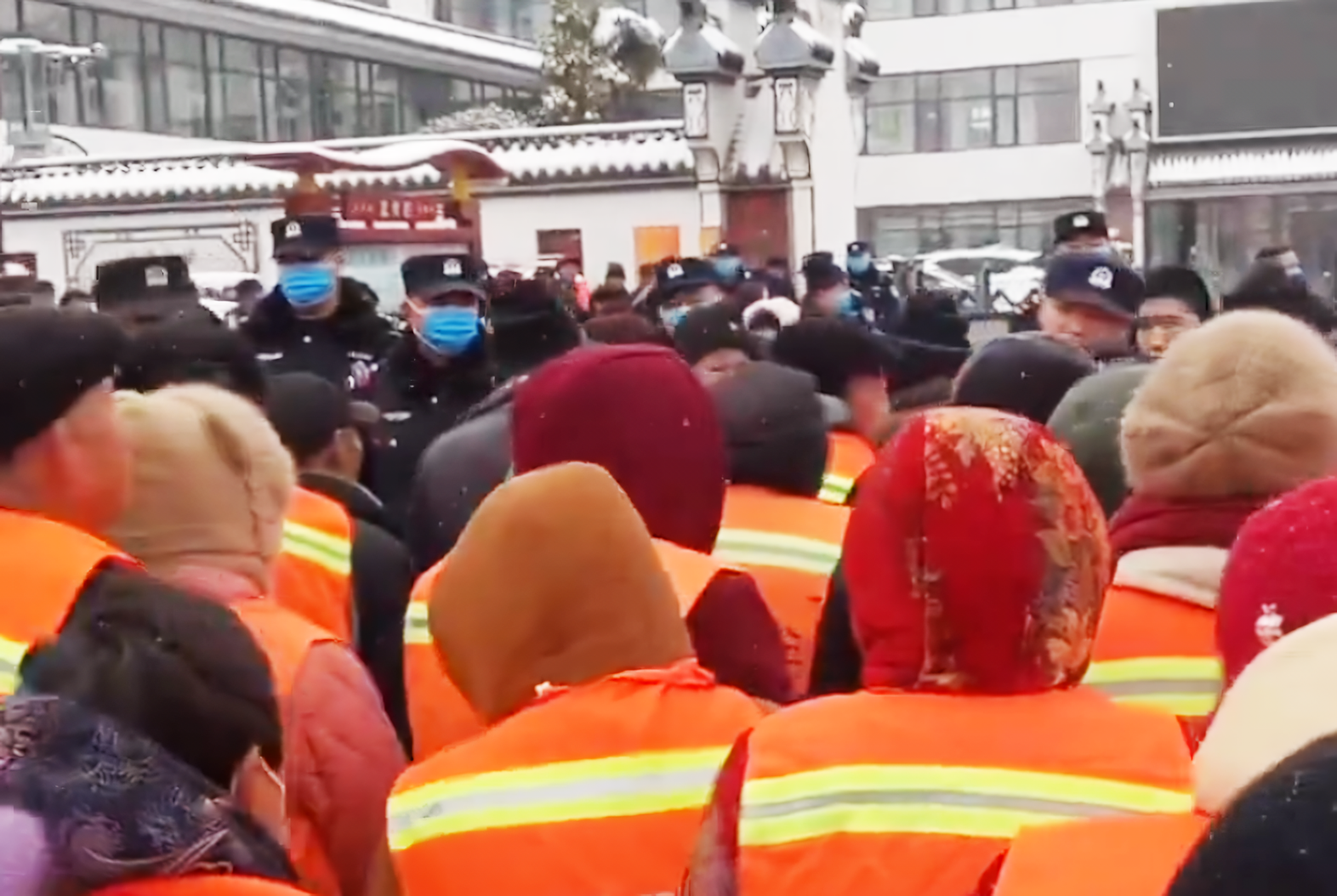Chinese New Year was supposed to be a joyous occasion, but this year, despite the lights and festivities, it was cold and gloomy, given the economic crisis eating into the living conditions of the working class. But amidst the melancholy, there was also a wave of workers' wage protests that are increasing in frequency and intensity.
According to the China Labour Bulletin, 1,794 collective actions by workers were recorded in 2023, more than twice the number in 2022. During this year’s Chinese New Year period, there were even more frequent wage protests in many places. On their way home and around the dinner tables at the New Year's Eve dinner, the topics of unemployment, unpaid wages, discounted or cancelled year-end bonuses, and even bankruptcy were frequently discussed by Chinese workers. Economic and social crises are invisible dinner guests.
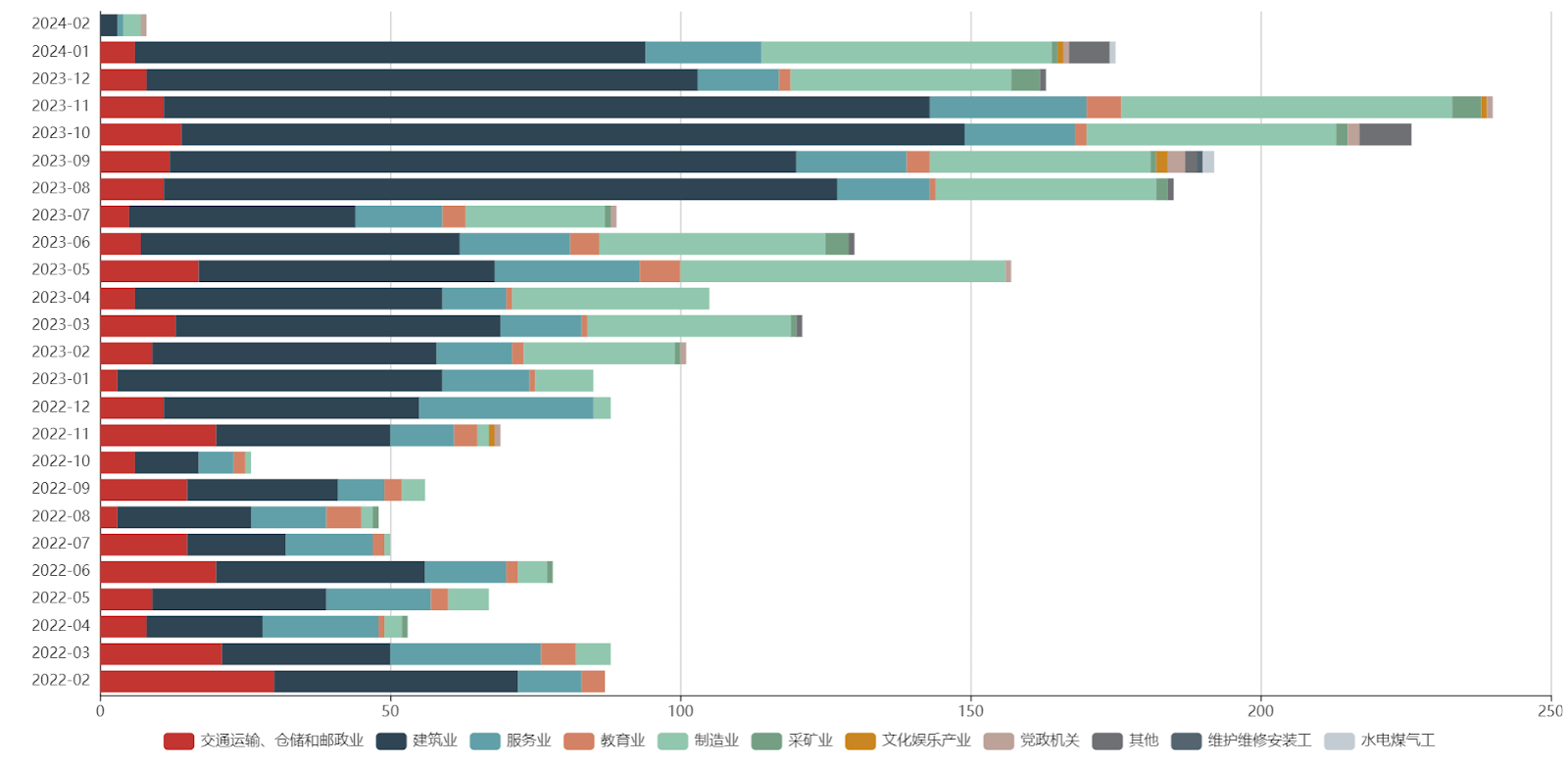 According to the China Labour Bulletin, 1,794 collective actions by workers were recorded in 2023 / Image: China Labour Bulletin
According to the China Labour Bulletin, 1,794 collective actions by workers were recorded in 2023 / Image: China Labour Bulletin
Farm workers' wage demands during the New Year are almost an annual tradition in capitalist China. Construction workers accounted for more than half of all collective protests in 2023. Many migrant workers say they have not been paid for a year or even two. At present, there are multiple protests over unpaid wages breaking out every day across the country.
The backdrop to this situation is China's real estate crisis and the seriousness of its corporate debt situation. The farmers and migrant workers are bearing the burden of the debt crisis that has trickled down from the real estate corporations, who are now strapped for cash and cannot pay the workers or finish the projects promised to the home buyers. In addition, there are many construction projects run by state-owned enterprises, but the local governments in China are so heavily indebted that they can't afford to pay for them.
In other words, the government takes the lead in non-payment of wages, and does not hesitate to use police force to suppress workers when they demand wages. Moreover, in the construction field, a large number of rural workers do not have signed labour contracts, which partly adds to the difficulty in claiming wages. But they are also aware that labour contracts are useless. In other words, they are aware that in this capitalist China, legal protection for workers is a dead letter.
At the same time, we have also seen changes in the class consciousness of the rural workers, which is being raised in the course of struggle. In a recent unpaid wage incident in Xi'an Zhongnan Junqi on 7 February, a crying worker knelt down to his boss, while his fellow workers immediately stopped him and picked him up, shouting: "Don't kneel down, don't kneel down, they don't deserve it!” Kneeling is an extremely passive and painful gesture in China, and it has been common for migrant workers to kneel in order to get their wages. But the phrase "don't kneel" speaks to the workers' growing willingness to stand up and fight.
Industrial workers on strike
Notably, there was a large increase in strike protests (spontaneous pickets) by industrial workers in the manufacturing sector in 2023, with 438 such collective actions, more than a ten-fold increase from 37 in 2022. The main industries involved are apparel and electronics manufacturing.
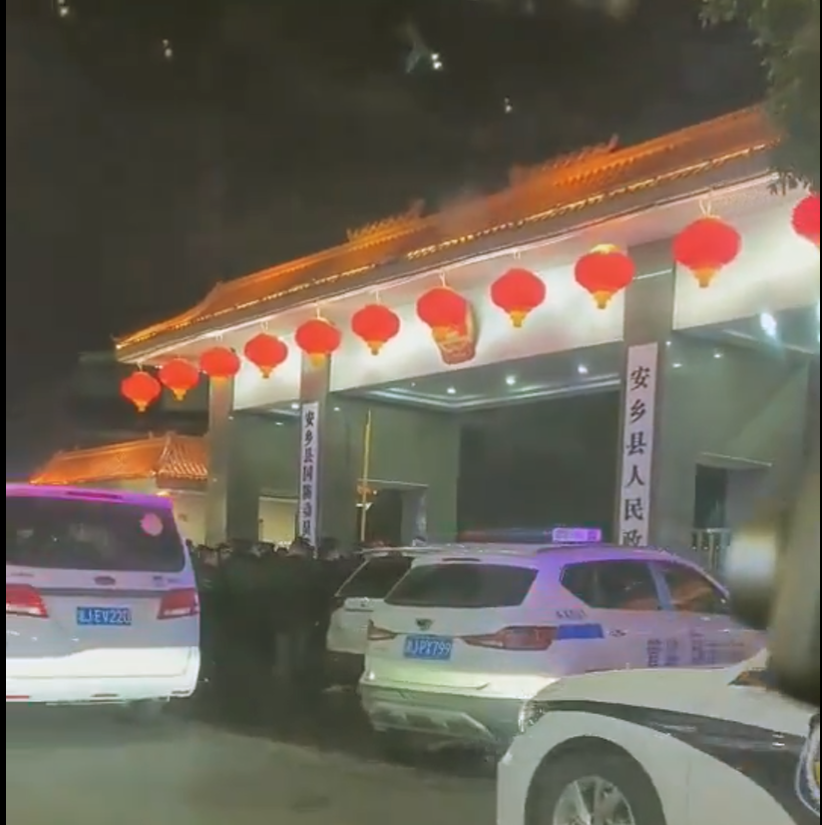 On New Year's Eve, rural workers in Changde Anxiang County, Hunan Province, who were seeking wages, blocked the gate of the county government / Image: fair use
On New Year's Eve, rural workers in Changde Anxiang County, Hunan Province, who were seeking wages, blocked the gate of the county government / Image: fair use
Against the backdrop of the global capitalist economic crisis, China's capitalist ‘overcapacity’ (i.e. overproduction), the shrinking of domestic and international markets, and the inability to sell products at a profit, have gradually led to the bankruptcy of private enterprises. To protect the interests of the capitalists, the proletariat in their factories will bear the brunt of longer overtime work, lower wages, non-payment of wages, forced resignation and effective layoffs using other excuses, and so on. While industrial workers are under severe attack, Chinese capital is flowing out of China in search of cheaper labour in places like Thailand.
The collective nature of factory work means that struggles by industrial workers have been especially militant, reflected in the frequency of strikes in the manufacturing sector in 2023. Among other things, we can also see how multiple protests feed into and reinforce one another. Shortly after the 10,000-strong protest march in Ningling, workers in a factory in Ningling went on strike to fight for their rights. It is not difficult to imagine that this uptick in protests and rallies is showing workers the power of collective struggle, giving them the confidence and courage to fight for their rights.
Similarly, it was the mighty struggle of the Foxconn workers during the pandemic that sowed hope of victory in the minds of the masses, and stimulated the unblocking protests that subsequently spread across the country.
Even apart from the construction and manufacturing sectors, where the battle is concentrated, there is basically no sector in which the proletariat can escape the attacks of the ruling class. Competition in the transport sector has intensified, with truck drivers sacrificing their rest time to save money, which clearly increases the risks of driving. It has also become commonplace for takeaway drivers to fight tooth and nail on the highway over order fees and fines.
The crisis has also led to intensified attacks on workers in the fields of sanitation, healthcare and education, impacting social services utilised by all workers. On 4 February 2024, more than 100 sanitation workers in Xiayi County, Shangqiu City, Henan Province, went on strike at the entrance of the government office in order to claim their unpaid wages. In the healthcare sector, many hospital workers claimed that they had not received their wages for many months. In Gansu Province, the Jingchuan County Hospital of Traditional Chinese Medicine has been in arrears with performance pay for 15 months, and temporary staff are paid just over 1,000 yuan a month, making it impossible to protect their basic livelihoods.
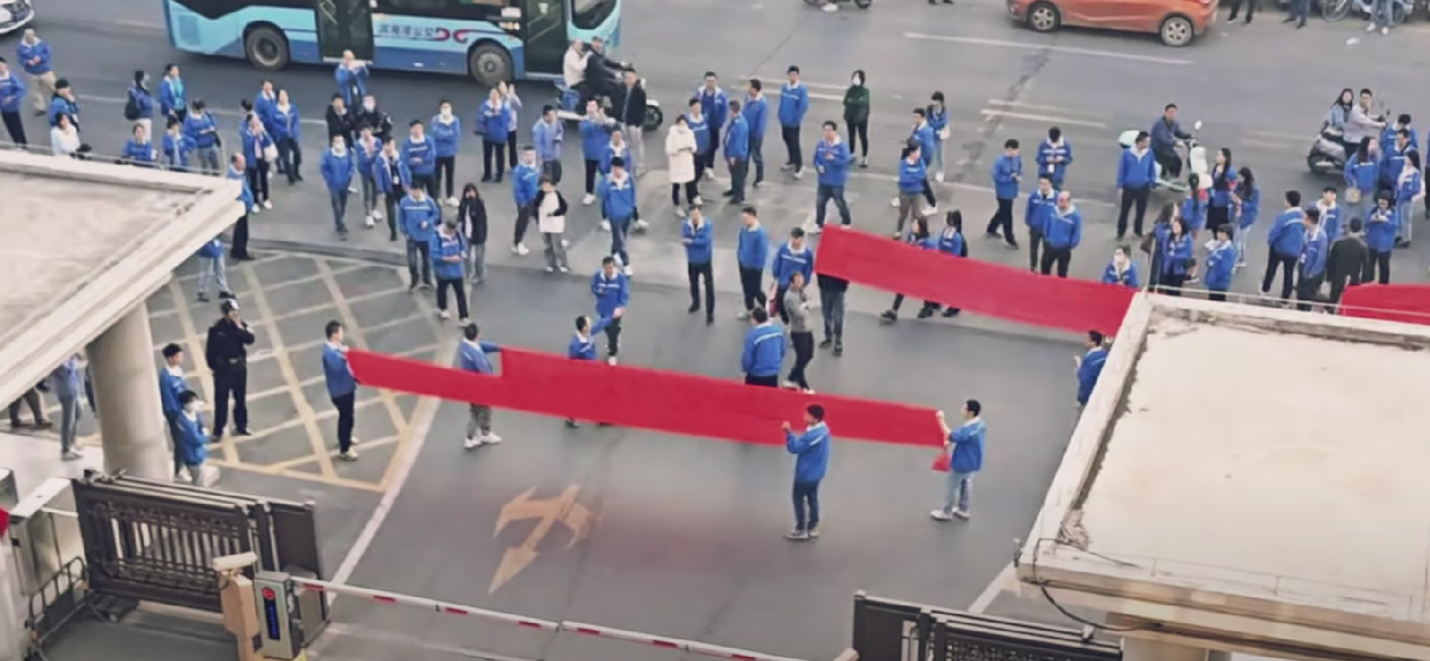 Guangdong Tsit Wing workers are on strike / Image: fair use
Guangdong Tsit Wing workers are on strike / Image: fair use
Such relentless attacks are not uncommon in the education sector. Jinxian County in Nanchang City, Jiangxi Province, owed primary and secondary school teachers unpaid wages, prompting them to go on strike. On the evening of 2 November 2023, hundreds of teachers gathered at the entrance to the county government in protest, shouting slogans such as "we want to live". In addition, bus drivers in Liaoyang, Liaoning, bus drivers in Tianjin, and metro drivers in Kunming have been owed wages for several months.
The attacks on the rights and interests of the workers will not end here, but will only intensify, given the economic crisis. However, society cannot function without the labour of the proletariat. If sanitation workers don't clean the roads, the roads will be clogged; if bus drivers don't drive, people won't be able to go to work; if teachers don't work, workers will have to stay home to look after their children. The workers control the lifeblood of society. Strikes are a powerful weapon, but workers still need to be awakened by these struggles to realise the power in their own hands.
If you are not a bureaucrat or a big capitalist, then no job is guaranteed in China. Governmental jobs were once considered the “iron rice bowl”: secure and well-paid. While the wave of public examinations continues, many civil servants are resentful that they have to endure chronic salary arrears. No one's stomach can be filled by the CCP’s lies that the economy is on the upswing. Local governments are heavily in arrears. Civil servants face pay cuts and non-payment of wages in many places, and some local governments even had to go to temples to borrow money to pay their salaries.
On the other hand, we can see that the CCP has invested more in maintaining stability by funding the state. The money given to the police and hired thugs of the private security companies for wiretapping and suppressing the masses is precisely the hard-earned money of the labourers. However, no matter how much the CCP invests in ‘security’, there is always a limit. In the face of the police, the number of proletarians and the rest of the labour force is overwhelming, and as people sarcastically say about the police on the Internet: "What's the point of working for 3,000 yuan a month?” Even if the police and army are strong, most of them come from working-class families, and elements within them will sway at the sharpest moment of class conflict. In a revolutionary situation, the state’s armed bodies will not be able to resist the working class in struggle.
The fight for wages goes international
Finally, we can also see an international dimension to the wage arrears in China during the crisis. Chinese imperialism slashed investment in the Belt and Road Initiative during the crisis, and many Chinese workers who have followed Chinese companies on overseas construction trips have been owed wages.
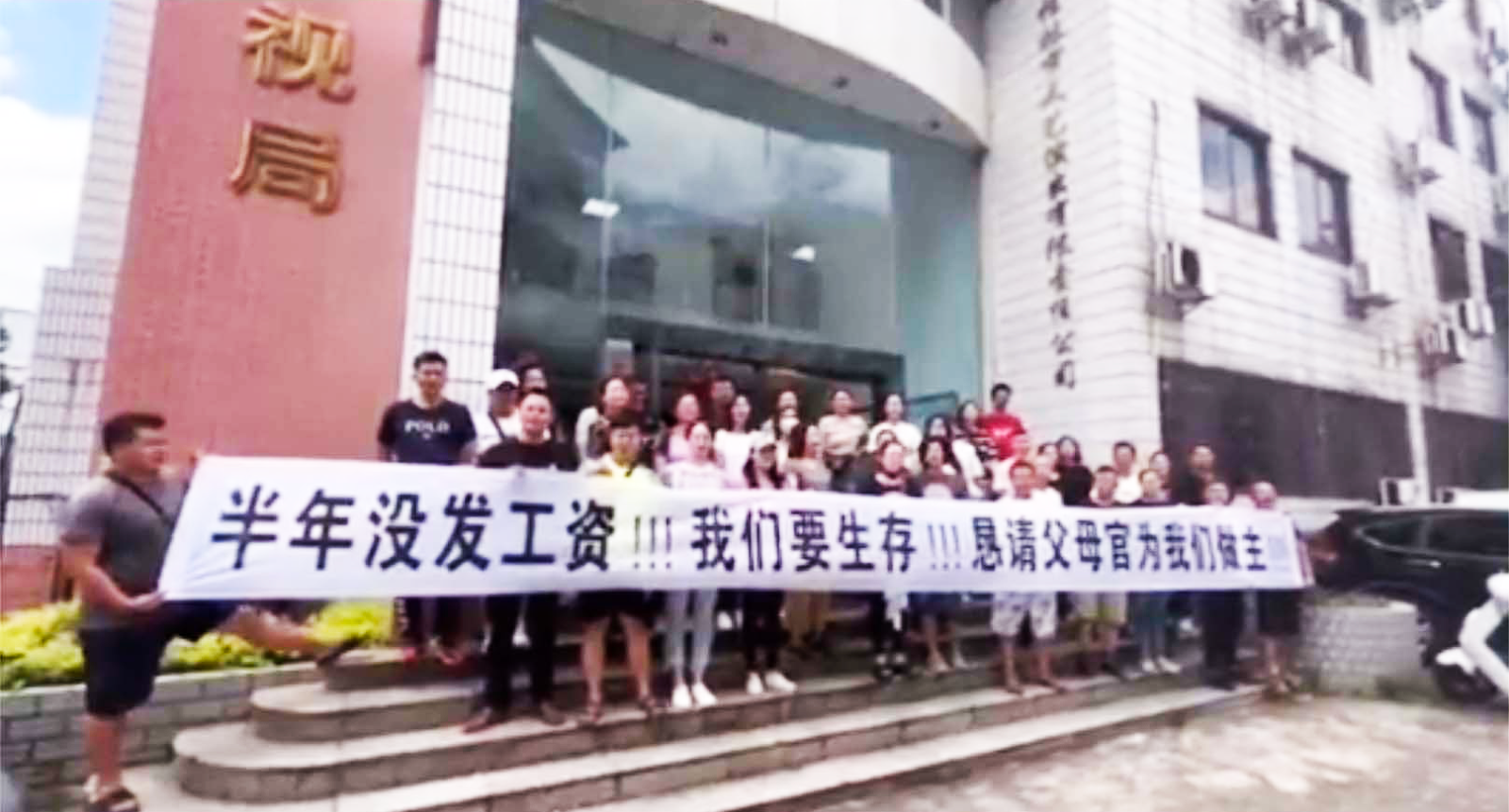 Employees of Guilin Guangdian Electricity System hold a banner to demand their wages / Image: fair use
Employees of Guilin Guangdian Electricity System hold a banner to demand their wages / Image: fair use
In Poland and Egypt during the New Year, there were cases of workers demanding their wages. North Korean workers in Jilin rioted because of unpaid wages. They went on strike, and even destroyed equipment and abducted North Korean officials in China. This display of workers’ fury shocked anyone who hitherto assumed they would meekly accept repression. There are fewer more repressive governments than that of North Korea. But the deeper the oppression, the more violent the eventual outburst. We could say much the same of the Chinese masses.
What is to be done?
The present phenomenon of unpaid wages reveals the Chinese workers’ urgent need for genuine trade unions. Through mass organisations of struggle, the workers can fight in a disciplined and effective way. They can coordinate their attacks or retreats with other sections of the proletariat, thus educating the workers in collective struggle. These organisations cannot be imposed on the workers, but must develop from the organic need to defend their interests.
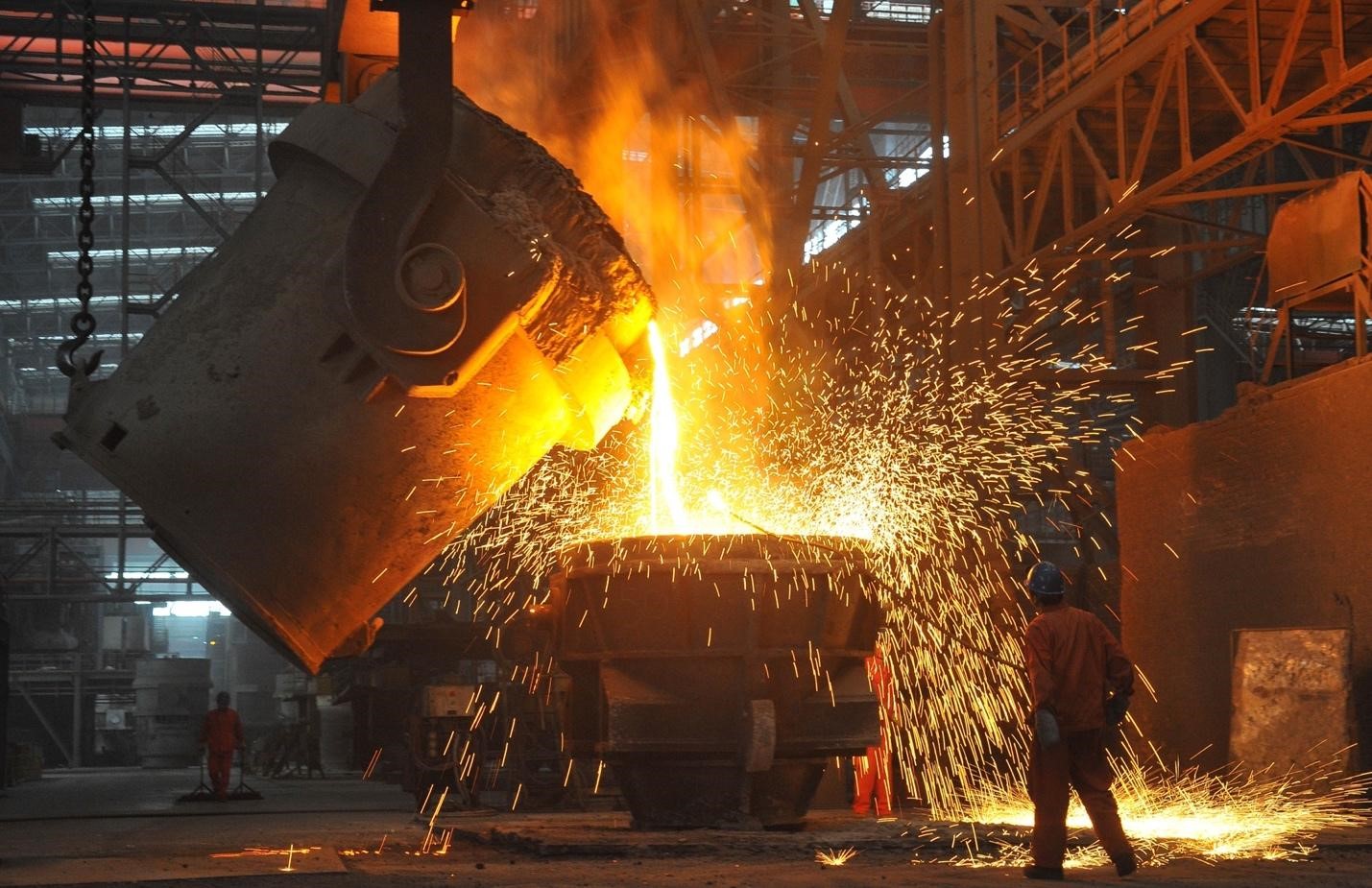 No amount of repression can stop the wheel of history being turned by the Chinese working class / Image: Depositphotos
No amount of repression can stop the wheel of history being turned by the Chinese working class / Image: Depositphotos
The current wage protests and struggles are just the beginning of the intensification of class struggles in China. The workers will continue to fight with increasing frequency and militancy, under more savage attacks and oppression; the bourgeoisie will mercilessly crack down on the workers economically; and the CCP, which stands on the side of the bourgeoisie, will intensify its repression as well.
Nevertheless, no amount of repression can stop the wheel of history being turned by the Chinese working class. As the new year dawns in China, the world can look forward to even more titanic class battles in the Middle Kingdom, and the ideas of revolutionary communism will be the most important weapon for the Chinese proletariat to win.

